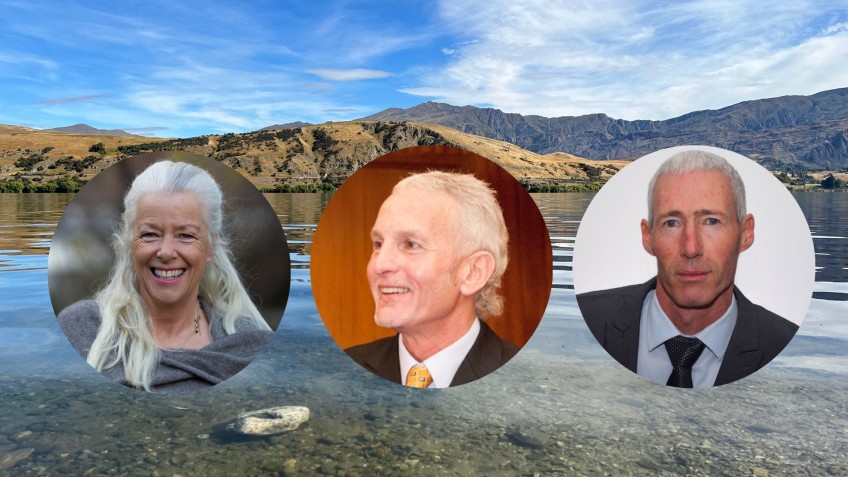Dunstan councillors disagree on future for controversial land and water plan

The new government has provided the Otago Regional Council with a three-and-a-half year extension on a deadline for delivering a land and water plan for Otago, but whether councillors take them up on the offer is still undecided.
However, Cromwell-based Dunstan councillor Michael Laws thinks the only "sane" option is for the council to press pause on its plan and continue once replacement policy on freshwater management has been nutted out by Wellington decision makers.
He is frustrated a full day council workshop on the plan is continuing tomorrow.
Under a current timeline, the council was working towards notifying its draft plan, five years in the making, in June.
But, in a letter to the chair and deputy chair of the council on Friday, Minister for the Environment Penny Simmonds confirms her government will be replacing the National Policy Statement for Freshwater Management 2020 (NPS-FM), which underpins much of the council's draft plan.
She says "the extension will enable time to replace the NPS-FM and for all councils to then align and update their plans".
If the council is considering pushing on regardless, she says she wants to understand why, and is asking for "an outline of the costs, benefits, and implications" of any decision to notify the plan before the national policy statement is replaced.
In a statement, ORC chair Gretchen Roberston acknowledges the letter and the extended deadline, and says it will be considered by councillors at their full council meeting on March 27.
It is Councillor Law's view tomorrow's scheduled seven-hour workshop for councillors is proof the ORC seems "intent upon ignoring" what he is calling a "directive" from the new environment minister.
"The basic problem is that the ORC draft plan was created under the policy and philosophy guidance of legislation and directives that this new government has confirmed will be rescinded and replaced.
"The current ORC draft plan is infused with the national policy statement on freshwater, and a wider policy imperative called 'Te Mana o te Wai'."
He says the latter "gifts the water a soul" and "contains a considerable input of Māori mysticism".
He believes the ORC will need to start "all over again" with a new plan to match the indicated shift in policy thinking from Wellington.
"ORC's defiance isn't a sane option."
However, fellow Dunstan councillor Alexa Forbes does not believe tomorrow's workshop shows any "defiance" towards the new government from regional councillors.
On the agenda is working through close to 35 pages of submission summaries from stakeholders on the draft plan.
She says these submissions were "made in good faith", with contributors putting time and resources into preparing them, and it is her view councillors should assess them because it would be "just really rude not to".
"That feedback will be incredibly valuable, no matter how the timeframe is pushed out."
She pushes back at Councillor Laws' interpretation of Te Mana o te Wai, admitting she is an "environmentalist" as she does so, saying it prioritises the health of freshwater rather than "Māori mysticism".
She thinks plenty of people in Otago want clean rivers and lakes, and the tourism sector largely depends on it, yet at the moment the region is falling short.
"Sixty-seven percent (of waterways) fail one or more bottom lines...That's not acceptable in a place with as little population as Otago."
A desire to have swimmable freshwater is not limited to a Labour-led government, in her view.
"This government can't possibly want anything else.
"I actually don't think things are going to change that much...The 'hows' will change a bit; the 'why' won't change."
It is her view things will continue "moving in that direction" but it may not be "pedal to the metal" as it has been in terms of the pace of policy change.
"I have no problem with slowing things down, as long as we are going towards that goal of freshwater."
Third Dunstan councillor Gary Kelliher, a sheep and deer farmer near Alexandra, thinks there will be significant pushback from impacted sectors if the council continues on its current track of reform.
Like Councillor Laws, he wants work on the draft plan to be halted as "the overarching principles that have influenced almost all of its directions" are set to be changed by the government.
"They see the devastating impact they (the principles) will have on the regional economies of New Zealand if allowed to continue to guide regional plans.
"For Otago, if the current plan was to be notified, it will decimate much of what is currently undertaken across our rural areas."
It is his view people set to be impacted by the changes outlined in the council's new plan "are not going to sit back and say, 'Oh well, council must be right with this'".
"They will fight the plan, they will show better science and justification for their existence than the ORC has shown, and while they are fighting this process the new government will bring in new overarching principles that reset the fight again."
Councillor Kelliher blames "a very green-leaning majority of councillors who preferred the previous minister's direction" for pushing forwards with the plan despite early indications from the new government of a significant policy shake up in the space.
Last month, after the ORC chair and deputy chair - Councillor Gretchen Roberston and Councillor Lloyd McCall - and senior council staff met with government ministers to discuss plans to change the national policy statement on freshwater and what effect it may have on the council’s draft land and water plan, the council voted eight to four in favour of not delaying its upcoming notification of the plan.
Crux has asked for an indication of how many staff hours and what budget to date has been assigned to the development of the plan.
However, we have been told staff can not provide any further comment on the topic until councillors have had the opportunity to discuss the minister's letter.
Read more:
Mammoth ORC policy shake up will impact urbanites, not just farmers


























